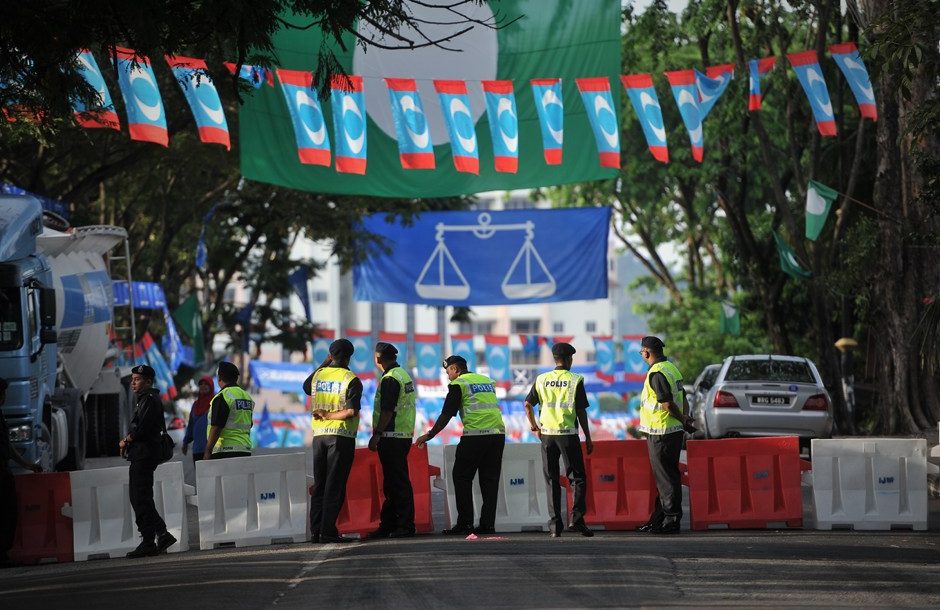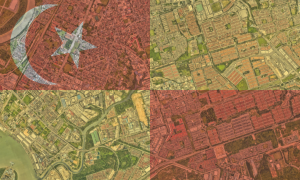Few observers of Malaysian politics have made hard and fast predictions about the outcome of elections and not lived to regret it.
Nevertheless, it’s customary to wrap up a New Mandala pre-election series with a few guesses as to what the results might be. So, we’d like to offer up four scenarios for today’s election, based on our observations of the campaign and conversations with Malaysian and international experts clued in on the electoral dynamics in the country.
We’ll find out how right or wrong we are tonight, when New Mandala will be hosting a live blog from the Australian National University campus in Canberra, with guest bloggers contributing analysis and observations from the ground in Malaysia. You can keep up with our contributors’ commentary at the Live Blog page from 5:00pm KL time/7:00pm Australian Eastern Standard Time.
Until then, here are what we think are some possible outcomes of today’s vote, ordered from most probable to least probable:
1: BN wins the election, but loses the popular vote and wins with fewer seats than in GE13 (133 seats).
How? BN does well in Sabah and Sarawak and holds a significant number of Malay-majority seats in Peninsula, in part as a result of malapportionment and the role of PAS in splitting the non-UMNO Malay vote (i.e. what Malaysian politicos are calling the “three-cornered fight” phenomenon). BN wins somewhere between 112-130 seats.
The popular vote can be used to try to claim a moral victory. The Anwar Ibrahim-led Pakatan Rakyat coalition won 51% of votes in at GE13 in 2013. If the latest opinion polling from the Merdeka Center is accurate, then BN neither the two main coalitions will win a popular vote majority, with PAS taking up the remainder.
What would this mean? Barisan’s declining popular vote contributes to the erosion of Najib’s legitimacy in the eyes of both the Malaysian public and the international community. If UMNO loses significant ground in the seat count, disgruntled UMNO members have further reason for finding another prime minister when (or if) they hold party elections. Najib had previously delayed these party elections, saying he wanted his party to focus on GE14. If the result is bad, the knives will be out. Najib has shown himself to be a smart political operator, but will need to continue to harden his rule to do so. This means more crackdowns on political opponents, on media freedom (online and offline) and civil liberties more broadly. And expect more pro-Malay, Islam policies to shore up popular support.
2: Hung parliament. PAS supports BN which enables it to retain power.
How? BN wins less than 112 seats but more than or similar number to the opposition. Together with seats from PAS (presuming PAS gets enough to get BN over the line) BN are able to form a minority government.
Social media struggles for the opposition as BN surges
Social media is now central to any Malaysian election campaign. In 2018, the opposition is facing a far better organised incumbent than last time.
3: BN wins the election with more seats than in GE13.
How? Mahathir’s party flops, due in large part to poor local candidates and lack of party machinery in rural areas. Or, BN benefits significantly from the “three-way fights” as PAS splits the non-UMNO Malay vote, leaving BN winning seats on plurality thanks to the first-past-the-post system. BN does well in Johor in particular, which would be a big disappointment for the opposition.
What would this mean? That Najib has significant legitimacy in the eyes of his party, UMNO, given that the result was better than the previous election. He is wholeheartedly reinstated as UMNO leader in party elections next year. His immediate subordinates presumably win their seats, and remain happy with a Najib-led government. If the BN wins the crucial two-thirds parliamentary majority, that would mean they have the power to change the constitution.
4: The opposition wins the election. Mahathir becomes prime minister.
How? The “Malay tsunami” happens, and the opposition wins around 100 seats in Peninsular Malaysia. PAS voters switch to opposition parties PKR and Amanah. Or, Sabah’s Heritage Party (Warisan) is successful enough to help get PH over the line.
What would this mean? Mahathir would declare an undisputed victory, but the immediate question would be whether Najib accepts defeat. The recent comment by the armed forces chief and the police that they don’t support any political party is significant, suggesting that the potential for regime change is at least being discussed. But would the BN really give up power? The 2016 National Security Council Bill gives virtually unlimited powers of the Prime Minister to call a state of emergency in a particular state or indeed nation-wide.
 Facebook
Facebook  Twitter
Twitter  Soundcloud
Soundcloud  Youtube
Youtube  Rss
Rss 



